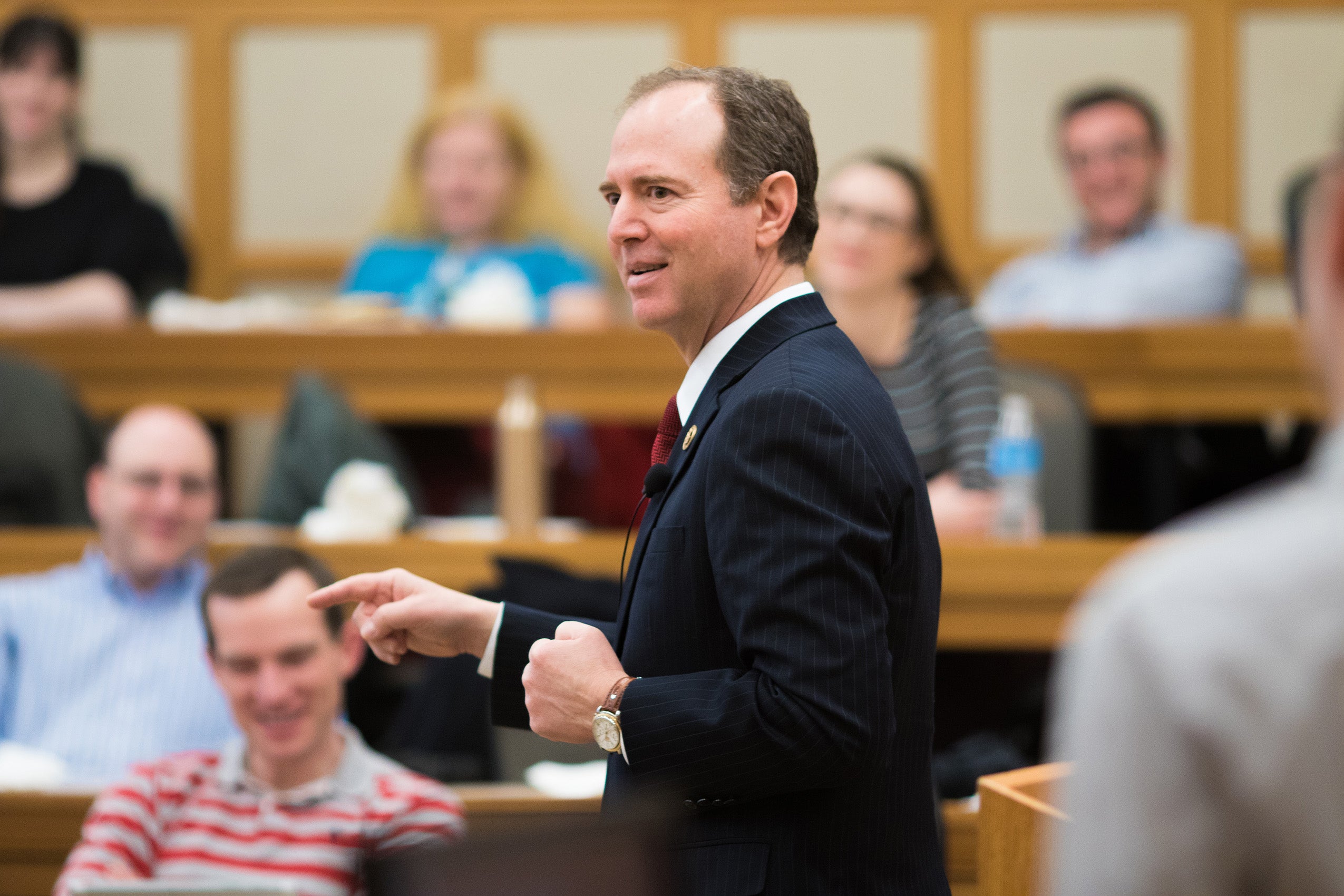As a ranking member of the House Permanent Select Committee on Intelligence, Congressman Adam Schiff ’85 (D-Calif.) is in the middle of one of the year’s biggest news stories, the investigation of Russia’s role in the last U.S. Presidential election. He brought some perspective on that story to Harvard on Tuesday, when he spoke to a noontime crowd as part of this week’s Journal On Legislation symposium.
Before getting into the Russia investigation, Schiff talked about the larger issue of the intersection between privacy and security. The boundaries, he said, were tested at the time of the Edward Snowden leaks, when it came out that the government possessed metadata that came from telephone companies. While this data did not include the names of any citizens, it did show which numbers had called other numbers—potentially useful in tracking terrorist activity, but also a possible invasion of private citizens’ privacy. “We wrestled it to the ground and came up with a bipartisan solution,” he said. The result was the USA Freedom Act, which denied government rights to the metadata. “That sounds like an Orwellian title if there ever was one,” he said. “But [the Act reflected an agreement] that because phone companies already maintained this data, the government didn’t need to.”
A similar issue came up when an iPhone related to the San Bernardino terrorist attack was found to contain encrypted data. The phone was brought to Apple, who were unable to extract the data. “A phone now contains as much personal information as someone’s house,” Schiff said. “The technology company said ‘We can’t help you,’ and they designed the phone in such a way that they couldn’t.”
Moving onto Russia, Schiff said that the investigation is “quite breathtaking” in its size and scope, and needs to be conducted along with the committee’s “day job” of reviewing normal intelligence matters. “There are four buckets of issues that we are investigating,” he said. “The first is the very public assessment that Russia hacked our elections with the intention of sowing discord in our democracy, undermining Secretary Clinton and supporting Donald Trump. The first question is whether the intelligence committee got that one right—and frankly, I don’t think there is much debate that they did.”
The tougher question here, he said, was Russia’s motivation: Whether they were simply trying to cause havoc in American democracy, or were actively invested in Trump’s election. “If you could design a candidate for Kremlin purposes, this is exactly how you’d design him,” Schiff said, citing the recent Bill O’Reilly interview where the host called Putin a killer and Trump responded that we have killers too. “The Kremlin could not have written that line better,” Schiff said. “From the perspective of denigrating America, he just ratified the whole Russian argument.” But even if we don’t know exactly why Russia hacked the election, he said, we can safely assume that it did. Referring to an infamous Trump assertion, Schiff said “It wasn’t China, and it wasn’t some 400-pound guy sitting in his basement.”
The other three “buckets,” he said, are three related questions: What was the U.S. response to the Russian hacking, and how do we learn from it to have a more effective response in the future? Was there any actual collusion with the Russians? And finally, where did the leaks come from? But he added, there is now a fifth bucket as well, as President Trump has asked Congress to investigate whether he was wiretapped by former President Obama.
“I’m not even sure you can call that a bucket. It’s more like a cup with a drop of water in it,” Schiff said—but added that Congress may well have to pursue a serious investigation of the President’s claim. “My party affiliation is showing here, but I’m running out of expletives and adjectives on that one. There are a range of challenges, and it’s obviously fraught politically.”
As Schiff also pointed out, this won’t be the first time he’s been part of a politically fraught investigation. He briefly recalled the outcry that went up last year when he went on Chris Wallace’s Fox-TV show and claimed that Congress should have no part in investigating Hillary Clinton on Benghazi—a claim, he said, that was borne out by the results of the investigation. “I said the investigation would only have value if we could reach a joint conclusion,” he said, something that wasn’t likely to happen. “We had to give hazard pay to our interns after that.”
